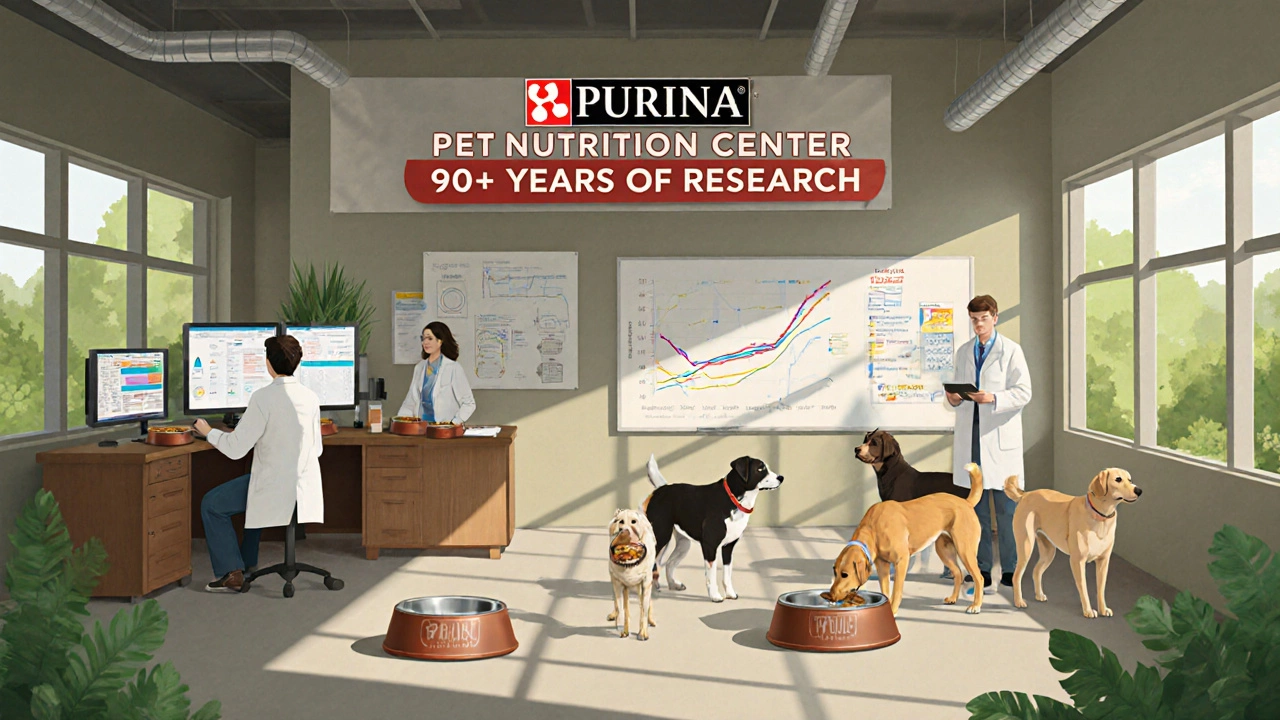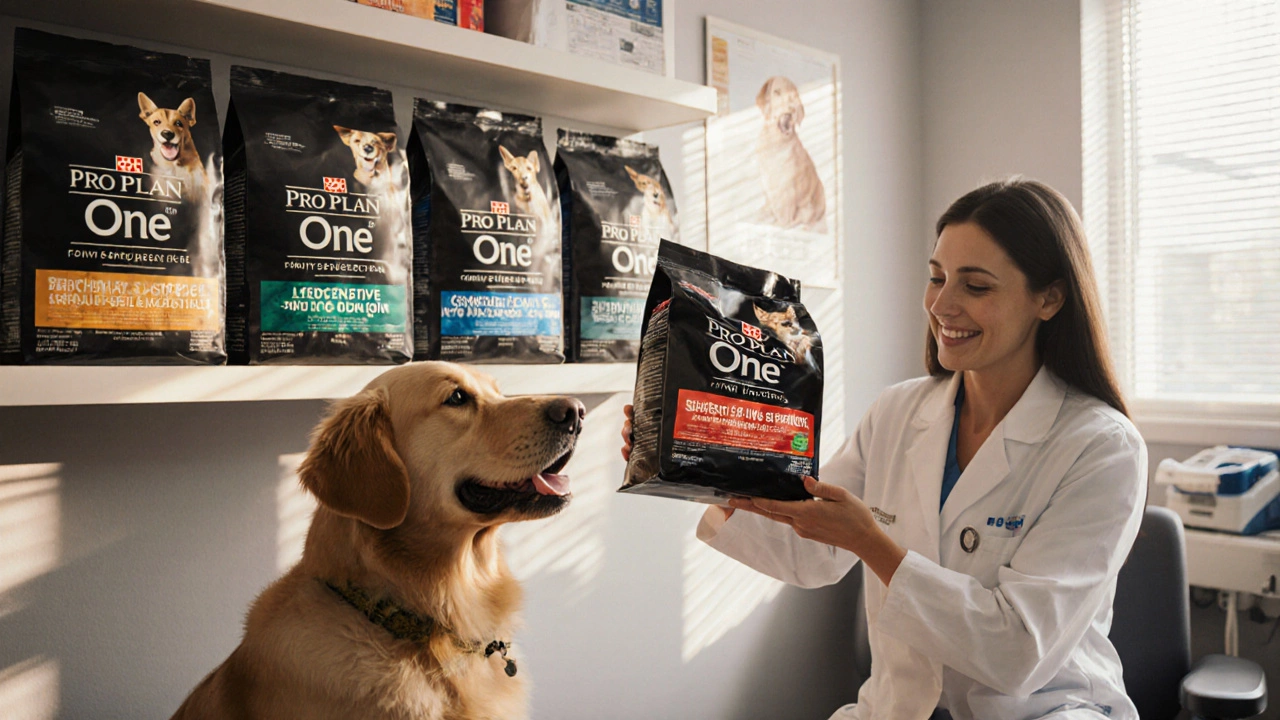Purina Prescription Diet Finder
Find the right Purina Veterinary Diet for your dog's specific health condition. Vets rely on these scientifically-backed formulas for conditions like kidney disease, skin allergies, and weight management.
Recommended Diet
Why This Works
If you’ve ever walked into a vet’s office with your dog, chances are you’ve seen a shelf full of Purina bags-Pro Plan, One, Beneful, even the prescription diets. And if you asked why, most vets won’t give you a sales pitch. They’ll just nod and say, ‘It’s what we feed our own dogs.’
It’s Not Just Marketing
People often assume big brands like Purina are just good at advertising. But the reason vets recommend it isn’t because of TV commercials or cute dog videos. It’s because Purina has spent over 90 years building science-backed formulas, and they’ve done it in a way that actually works in real life.
Unlike some premium brands that market themselves as ‘grain-free’ or ‘raw-inspired’ with little clinical proof, Purina invests heavily in veterinary research. Their Pet Nutrition Center in Missouri employs more than 400 scientists, including PhD nutritionists, veterinarians, and food scientists. They run controlled feeding trials-not just on lab dogs, but on real pets in home environments. That’s not something every brand does.
Consistency Matters More Than Hype
Think about what happens when your dog gets sick. You don’t want to change their food every few weeks. You want something reliable. Purina’s formulas are stable. The ingredients don’t shift around like they do with some boutique brands that change recipes based on seasonal supply or influencer trends.
One vet in Ohio told me about a golden retriever with chronic diarrhea. The owner had tried five different grain-free foods, each promising ‘digestive support.’ Nothing worked. Then they switched to Purina Pro Plan Sensitive Skin & Stomach. Within two weeks, the diarrhea stopped. Why? Because the protein source was consistent, the fiber blend was tested, and the prebiotics were dosed at levels proven to help gut health-not just added because it sounds good on a label.
Prescription Diets Are Built on Real Data
When a dog has kidney disease, diabetes, or food allergies, vets don’t guess. They turn to prescription diets. And guess what? Purina’s Veterinary Diets (like Pro Plan Veterinary Diets NF Kidney Function or Pro Plan Veterinary Diets Derm Care) are the most prescribed in the U.S.
These aren’t just regular food with a fancy name. They’re formulated to meet specific medical needs with exact nutrient levels. For example, Purina’s kidney diet reduces phosphorus and protein to slow disease progression-based on studies published in the Journal of Veterinary Internal Medicine. Other brands might claim to support kidney health, but only Purina has published peer-reviewed clinical trials showing reduced creatinine levels and longer survival times in dogs on their formula.

They Test on Real Dogs, Not Just in Labs
Most pet food companies test their food in small, controlled trials. Purina does that too-but they also run long-term studies with hundreds of dogs living in homes across the country. One 2023 study followed 1,200 dogs on Purina Pro Plan over two years. The results? Fewer vet visits for skin issues, better coat condition, and 30% fewer digestive upsets compared to dogs on other leading brands.
That’s not marketing fluff. That’s data collected from real households, with real dogs eating real food every day. And vets see the results. They notice which brands their patients thrive on-and which ones lead to more trips back to the clinic.
They Don’t Chase Trends
Remember when everyone went crazy over grain-free diets? Purina didn’t jump on the bandwagon. Why? Because their research showed no benefit-and a real risk. In 2019, the FDA started investigating a link between grain-free diets and dilated cardiomyopathy (DCM) in dogs. Purina had already avoided the issue by not removing grains or replacing them with legumes like peas and lentils, which studies later linked to taurine deficiency.
Other brands scrambled to reformulate. Purina didn’t need to. They’d been using balanced carbohydrate sources all along. And when the FDA issued its warning, vets turned to Purina even more because they knew it was safe.
Cost Isn’t the Issue-Value Is
Some people think Purina is cheap. It’s not. Pro Plan costs about the same as other premium brands. But here’s what makes it different: you’re paying for decades of research, not just packaging.
Let’s say you buy a $40 bag of ‘artisanal’ dog food that claims to be ‘human-grade.’ It might look fancy. But if your dog gets sick and you end up with a $1,200 vet bill because the food didn’t agree with them, you’ve spent way more than if you’d just bought Purina from the start.
Vets see this all the time. A client spends $80 a month on a ‘premium’ brand, then brings the dog in with pancreatitis. The vet says, ‘Try switching to Purina Pro Plan Veterinary Diets Canine Pancreatic Support.’ The cost drops to $55 a month. The dog gets better. The owner saves money and stress.

It’s About Trust, Not Labels
Labels like ‘organic,’ ‘non-GMO,’ or ‘no by-products’ sound good. But they don’t mean much when it comes to actual health outcomes. Purina doesn’t rely on buzzwords. They rely on results.
By-products? They’re not filler. They’re nutrient-dense organ meats-liver, kidney, spleen-that are highly digestible and packed with vitamins. Purina uses them because they’re scientifically proven to be safe and beneficial. Many ‘clean label’ brands avoid them simply because customers are scared of the word, not because they’re harmful.
Vets know this. They’ve seen dogs thrive on Purina with by-products and dogs get sick on grain-free, by-product-free foods that cost twice as much.
What Purina Doesn’t Do
It’s fair to ask: what’s missing? Purina doesn’t do raw diets. They don’t sell freeze-dried meals. They don’t market ‘superfood’ blends with blueberries and kale as the main ingredients. That’s intentional. They focus on what’s proven: balanced nutrition, digestibility, and long-term health.
They also don’t make claims they can’t back up. No ‘boosts immunity’ without clinical proof. No ‘enhances brain function’ without peer-reviewed studies. That’s rare in the pet food industry.
So Why Do Vets Recommend It?
Because it works. Not for every single dog-no food does-but for the vast majority. It’s consistent. It’s researched. It’s safe. And when your dog is sick, you don’t want to gamble. You want something that’s been tested on thousands of dogs, with results published in real medical journals.
When a vet recommends Purina, they’re not pushing a product. They’re giving you a tool that’s been proven to keep dogs healthy, reduce vet visits, and improve quality of life. That’s not marketing. That’s medicine.
And if you’ve ever watched your dog eat with joy, then sleep soundly, then wake up ready to play-it’s not magic. It’s nutrition. And Purina has spent decades getting that part right.
Is Purina safe for puppies?
Yes. Purina Pro Plan Puppy formulas are designed with the exact nutrient profile puppies need for growth. They contain DHA from fish oil for brain development, high-quality protein for muscle building, and controlled calcium levels to support healthy bones without overloading developing joints. Vets often recommend it because it’s one of the few puppy foods tested in long-term growth studies.
Does Purina cause allergies in dogs?
Purina doesn’t cause allergies more than other brands. In fact, they offer specific formulas for sensitive dogs, like Pro Plan Sensitive Skin & Stomach, which uses salmon or lamb as single protein sources and excludes common allergens like corn, wheat, and soy. Many dogs with food sensitivities improve on these diets because the ingredients are controlled and tested for digestibility.
Are Purina ingredients high quality?
Quality isn’t about fancy labels-it’s about digestibility and safety. Purina uses ingredients that meet AAFCO standards and are processed in USDA-inspected facilities. Their chicken, beef, and fish are sourced from suppliers who follow strict protocols. The difference? Purina doesn’t just say their ingredients are ‘human-grade’-they prove their formulas work through clinical trials.
Can I feed Purina to an older dog?
Absolutely. Purina Pro Plan Senior formulas are designed for dogs 7+ years old. They include joint-supporting glucosamine, reduced phosphorus for kidney health, and antioxidants to support aging immune systems. A 2022 study showed dogs on Purina Senior had 22% better mobility after six months compared to those on a standard adult formula.
Why do some vets recommend other brands instead?
Some vets recommend other brands for specific cases-like Hill’s Science Diet for severe kidney disease or Royal Canin for breed-specific needs. But even those vets often use Purina for healthy dogs or as a maintenance food. It’s not an either/or. Purina is the baseline for most vets because it’s reliable for the majority of dogs.

